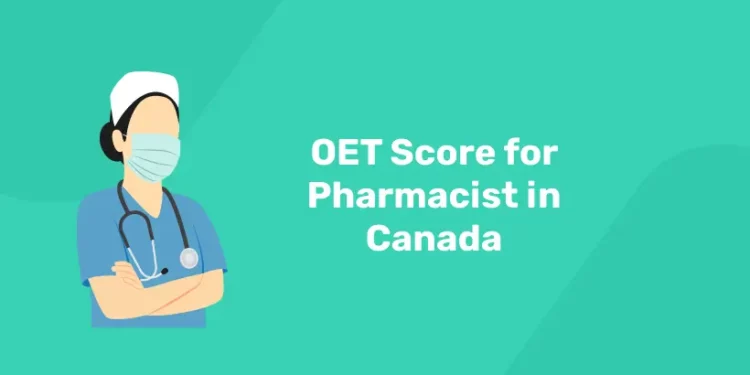Table of Contents
Starting a pharmacy career in Canada is a great opportunity, but there are requirements to consider, that is you can speak and write English well. An evaluation of English language proficiency tailored to the unique requirements of the healthcare industry is the Occupational English Test (OET). One of the most important steps in the license procedure for pharmacists who want to practice as Pharmacist in Canada is getting the necessary OET score.
We will discuss the significance of the OET for Pharmacist in Canada, the score requirements established by Canadian regulatory agencies, and test-taking strategies in this blog. Knowing these prerequisites will help you navigate the process with clarity and confidence, whether you are a student planning your career path or an overseas pharmacist wishing to relocate to Canada. Explore the specifics of the OET and how it influences Canadian pharmacy careers that are successful.
Elevate your OET scores with Entri! Join for Free Demo Class!
Introduction
An English language competency exam created especially for healthcare professionals is the Occupational English Test (OET). It evaluates the language proficiency of medical professionals wishing to get registered and work in an English-speaking setting. An OET score of 350 or more is regarded as a pass. The score ranges from 0 to 500.
In order to be eligible to practice in Canada, pharmacists must have an OET score of at least 350 overall, with at least 300 in each speaking, listening, reading, and writing. This must be fulfilled for thepharmacists to be granted a license to practice in the Canada.
A strong OET score is necessary to pursue a profession as the pharmacist in Canada since it proves your competence in the English language. And then, guarantees that you can interact with the patients and the coworkers in an efficient manner. Inaddition to ensure that you fulfill the required standards and will carefully review the OET scores specified by the PEBC.
Why is OET Required for Pharmacist in Canada?
OET ensures that the pharmacists in Canada have the necessary English language skills to perform their duties effectively. Also they maintain the high standards of patient care, and contribute positively to the healthcare system. The Occupational English Test (OET) is required for the pharmacists in Canada for several important reasons:
1. Communication with the Patients:
In order to give patients accurate information regarding medications, usage guidelines, and other matters, pharmacists in Canada must communicate with them in a clear and effective manner. English language competency guarantees that patients comprehend their treatment programs, which is critical for their well-being and safety. A pharmacist’s ability to communicate effectively with patients is essential to their job. In Canada, individuals who are looking for medical assistance frequently get in touch with pharmacists because they trust them to deliver accurate and straightforward information.
2. The Professional Standards:
English language competency is required by Canadian regulatory agencies, such as the Pharmacy Examining Board of Canada (PEBC), in order to guarantee that all pharmacists are able to fulfill the high standards of professionalism required in healthcare settings. Professional standards that guarantee patient safety and high-quality care are in place for the pharmacy profession in Canada. A key component of these requirements is obtaining the necessary score on the Occupational English Test (OET).
3. Collaboration with the Healthcare Teams:
Pharmacists collaborate closely with physicians, nurses, and other medical specialists. For the purpose of discussing patient care, organizing treatment plans, and guaranteeing team consensus for patient management, effective English communication is crucial. Pharmacists must effectively collaborate with healthcare teams in order to deliver crucial, well-coordinated care. The OET in Canada makes sure that pharmacists are fluent in English, which is necessary for them to collaborate well with other medical professionals.
4. The Accurate Documentation:
In Canada, pharmacists are in charge of keeping special and significant data, including as patient histories, prescription details, and dosage instructions. English language competency will lower the possibility of errors by ensuring that these documents are comprehensible and clear. Precise documentation is an essential duty of pharmacists, since it directly affects patient safety and the standard of treatment rendered. The Occupational English Test (OET) is a Canadian program that verifies pharmacists’ proficiency in the language in order for them to keep the crucial and distinctive records.
5. Education and the Counseling:
Informing patients about their medications and medical problems is a major responsibility of pharmacists. They must make complex medical information understandable to patients by explaining it in simple terms. For this educational function, having strong English language abilities is essential. When it comes to providing patients with information and guidance regarding their medications and general health, pharmacists are invaluable. Pharmacists in Canada are guaranteed to have the English language skills required to carry out these responsibilities with efficiency thanks to the Occupational English Test (OET).
6. The Public Health Role:
In Canada, pharmacists are frequently involved in public health initiatives like immunization programs and health promotion initiatives. English language proficiency enables them to interact with the public in an efficient manner, which in turn advances their overall health objectives. Pharmacists participate in initiatives that advance community health and prevent illness, which contributes significantly to public health. Pharmacists in Canada are required to pass the Occupational English Test (OET) to demonstrate that they possess the English language competency required to carry out their duties.
Elevate your OET scores with Entri! Join for Free Demo Class!
Canada OET Score for Nurses
As previously said, OET results are accepted by nations for nurses wishing to work in the medical field. There is some uncertainty over a nurse’s eligibility for OET. The OET tests, which were created especially for healthcare professionals, include a significant amount of material related to nursing.
It is necessary for nurses to receive a B in the OET Speaking, Reading, and Listening subtests and a C+ in Writing in order to work in the healthcare industry. To become authorized nurses in a foreign nation, nurses must receive a minimum score of 350 out of 500. Nurses seeking precise OET score requirements must first review the official website’s qualification standards before taking the exam and receiving their score.
OET Exam Pattern 2024
You can find the OET exam pattern for the nurses 2024 in detail.
| OET Exam Parts | Test Duration | OET Exam Description |
|---|---|---|
| Listening | 50 minutes | Three sections make up the listening component, which assesses the applicants listening comprehension in varied contexts. |
| Reading | 60 minutes | The three sections that make up the Reading portion assess the candidates’ ability to read in a variety of formats. |
| Writing | 45 minutes | The writing portion demands a letter of recommendation from candidates, specific to their field. |
| Speaking | 20 minutes | As part of the profession-specific Writing component, applicants must simulate a scenario from the healthcare industry. |
Elevate your OET scores with Entri ! Join for Free Demo Class!
Crack OET & Boost Your Healthcare Career!
OET Coaching by Entri App: Get expert guidance, practice with real exam scenarios, and achieve your target score to advance your healthcare career.
Join Now!Frequently Asked Questions
Is OET required for Canada?
Healthcare professionals also consider Canada to be among the nations where OET is most readily recognized. Obtaining a minimum score of 350 or a B on each OET component is required for employment in the Canadian healthcare sector. OET results are accepted by the College of Surgeons and Physicians of British Columbia.










